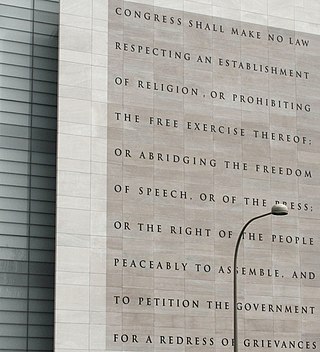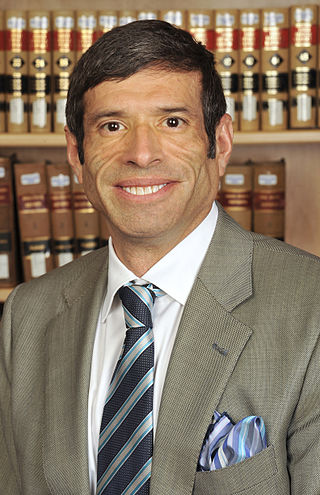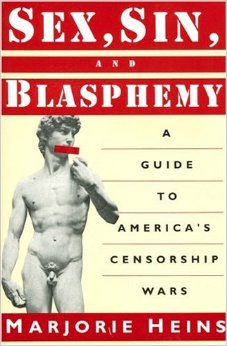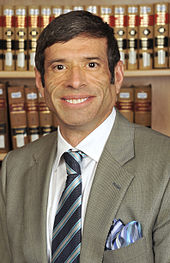Fighting words are spoken words directed to the person of the hearer which would have a tendency to cause acts of violence by the person to whom, individually, the remark is addressed. The term fighting words describes words that when uttered inflict injury or tend to incite an immediate breach of the peace.

The seven dirty words are seven English-language curse words that American comedian George Carlin first listed in his 1972 "Seven Words You Can Never Say on Television" monologue. The words, in the order Carlin listed them, are: "shit", "piss", "fuck", "cunt", "cocksucker", "motherfucker", and "tits".
Cohen v. California, 403 U.S. 15 (1971), was a landmark decision of the US Supreme Court holding that the First Amendment prevented the conviction of Paul Robert Cohen for the crime of disturbing the peace by wearing a jacket displaying "Fuck the Draft" in the public corridors of a California courthouse.
Tinker v. Des Moines Independent Community School District, 393 U.S. 503 (1969), was a landmark decision by the United States Supreme Court that defined First Amendment rights of students in U.S. public schools. The Tinker test, also known as the "substantial disruption" test, is still used by courts today to determine whether a school's interest to prevent disruption infringes upon students' First Amendment rights.

In the United States, freedom of speech and expression is strongly protected from government restrictions by the First Amendment to the U.S. Constitution, many state constitutions, and state and federal laws. Freedom of speech, also called free speech, means the free and public expression of opinions without censorship, interference and restraint by the government. The term "freedom of speech" embedded in the First Amendment encompasses the decision what to say as well as what not to say. The Supreme Court of the United States has recognized several categories of speech that are given lesser or no protection by the First Amendment and has recognized that governments may enact reasonable time, place, or manner restrictions on speech. The First Amendment's constitutional right of free speech, which is applicable to state and local governments under the incorporation doctrine, prevents only government restrictions on speech, not restrictions imposed by private individuals or businesses unless they are acting on behalf of the government. However, It can be restricted by time, place and manner in limited circumstances. Some laws may restrict the ability of private businesses and individuals from restricting the speech of others, such as employment laws that restrict employers' ability to prevent employees from disclosing their salary to coworkers or attempting to organize a labor union.
Prior restraint is censorship imposed, usually by a government or institution, on expression, that prohibits particular instances of expression. It is in contrast to censorship that establishes general subject matter restrictions and reviews a particular instance of expression only after the expression has taken place.
Chaplinsky v. New Hampshire, 315 U.S. 568 (1942), was a landmark decision of the US Supreme Court in which the Court articulated the fighting words doctrine, a limitation of the First Amendment's guarantee of freedom of speech.

Jack M. Balkin is an American legal scholar. He is the Knight Professor of Constitutional Law and the First Amendment at Yale Law School. Balkin is the founder and director of the Yale Information Society Project (ISP), a research center whose mission is "to study the implications of the Internet, telecommunications, and the new information technologies for law and society." He also directs the Knight Law and Media Program and the Abrams Institute for Free Expression at Yale Law School.

Fuck is a 2005 American documentary film by director Steve Anderson about the word "fuck". The film argues that the word is an integral part of societal discussions about freedom of speech and censorship. It examines the term from perspectives which include art, linguistics, society and comedy, and begins with a segment from the 1965 propaganda film Perversion for Profit. Scholars and celebrities analyze perceptions of the word from differing perspectives. Journalist Sam Donaldson talks about the versatility of the word, and comedian Billy Connolly states it can be understood despite one's language or location. Musician Alanis Morissette comments that the word contains power because of its taboo nature. The film features the last recorded interview of author Hunter S. Thompson before his suicide. Scholars, including linguist Reinhold Aman, journalism analyst David Shaw and Oxford English Dictionary editor Jesse Sheidlower, explain the history and evolution of the word. Language professor Geoffrey Nunberg observes that the word's treatment by society reflects changes in our culture during the 20th century.
In law, commercial speech is speech or writing on behalf of a business with the intent of earning revenue or a profit. It is economic in nature and usually attempts to persuade consumers to purchase the business's product or service. The Supreme Court of the United States defines commercial speech as speech that "proposes a commercial transaction".

Christopher M. Fairman was a professor of law at Ohio State University Moritz College of Law and Associate Dean for Faculty. He was also the C. William O'Neill Professor in Law and Judicial Administration.

Marjorie Heins (b.1946) is a First Amendment lawyer, writer and founder of the Free Expression Policy Project.
In the United States, censorship involves the suppression of speech or public communication and raises issues of freedom of speech, which is protected by the First Amendment to the United States Constitution. Interpretation of this fundamental freedom has varied since its enshrinement. Traditionally, the First Amendment was regarded as applying only to the Federal government, leaving the states and local communities free to censor or not. As the applicability of states rights in lawmaking vis-a-vis citizens' national rights began to wane in the wake of the Civil War, censorship by any level of government eventually came under scrutiny, but not without resistance. For example, in recent decades, censorial restraints increased during the 1950s period of widespread anti-communist sentiment, as exemplified by the hearings of the House Committee on Un-American Activities. In Miller v. California (1973), the U.S. Supreme Court found that the First Amendment's freedom of speech does not apply to obscenity, which can, therefore, be censored. While certain forms of hate speech are legal so long as they do not turn to action or incite others to commit illegal acts, more severe forms have led to people or groups being denied marching permits or the Westboro Baptist Church being sued, although the initial adverse ruling against the latter was later overturned on appeal to the U.S. Supreme Court case Snyder v. Phelps.
Sexual slang is a set of linguistic terms and phrases used to refer to sexual organs, processes, and activities; they are generally considered colloquial rather than formal or medical, and some may be seen as impolite or improper.
Fuck is an English term for the act of sexual intercourse, also used as an intensifier or interjection, and generally considered vulgar.
The F-Word is a book by lexicographer and linguist Jesse Sheidlower surveying the history and usage of the English word fuck and a wide variety of euphemisms that replace it. Sheidlower examines 16th and 17th century poetry, 20th century literature, and 21st century media uses of the word.
Intellectual freedom encompasses the freedom to hold, receive and disseminate ideas without restriction. Viewed as an integral component of a democratic society, intellectual freedom protects an individual's right to access, explore, consider, and express ideas and information as the basis for a self-governing, well-informed citizenry. Intellectual freedom comprises the bedrock for freedoms of expression, speech, and the press and relates to freedoms of information and the right to privacy.

Not in Front of the Children: "Indecency," Censorship, and the Innocence of Youth is a non-fiction book by attorney and civil libertarian, Marjorie Heins about freedom of speech and the relationship between censorship and the "think of the children" argument. The book presents a chronological history of censorship from Ancient Greece, Ancient Rome and the Middle Ages to the present. It discusses notable censored works, including Ulysses by James Joyce, Lady Chatterley's Lover by D. H. Lawrence and the seven dirty words monologue by comedian George Carlin. Heins discusses censorship aimed at youth in the United States through legislation including the Children's Internet Protection Act and the Communications Decency Act.

Sex, Sin, and Blasphemy: A Guide to America's Censorship Wars is a non-fiction book by lawyer and civil libertarian Marjorie Heins that is about freedom of speech and the censorship of works of art in the early 1990s by the U.S. government. The book was published in 1993 by The New Press. Heins provides an overview of the history of censorship, including the 1873 Comstock laws, and then moves on to more topical case studies of attempts at suppression of free expression.
Hazelwood School District et al. v. Kuhlmeier et al., 484 U.S. 260 (1988), was a landmark decision by the Supreme Court of the United States that held that public school curricular student newspapers that have not been established as forums for student expression are subject to a lower level of First Amendment protection than independent student expression or newspapers established as forums for student expression.









